Igor Sechin Reports to President of Russia the Progress on Rosneft Oil Company Major Projects
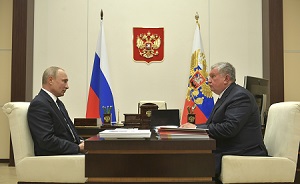
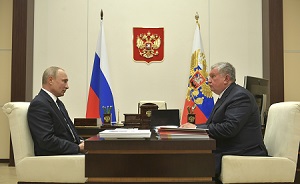 |
| Photo Credit: Press Service of the President of Russia |
Vladimir Putin has held a working meeting with Rosneft Oil Company Chief Executive Officer Igor Sechin.
“Rosneft is our leading company, the biggest company, the largest taxpayer,” said Vladimir Putin when opening the meeting.
The President of the Russian Federation invited Igor Sechin, as the head of the largest Russian oil company, to report on the situation in the industry and measures of support from the state. “How do you, as the head of our largest company, see the situation in the industry as a whole, how Rosneft feels, and which problems you consider the most important ones. It is clear that the drop in global demand is the most important problem for everyone. But for us, for Russian power sector, for Russian oil industry workers – what issues do you consider the most relevant and how, in your opinion, does the state need to support the industry?”, Vladimir Putin asked.
Igor Sechin noted that in 2019 Rosneft showed high production and financial and economic results and was the largest taxpayer, having generated 18 per cent of the federal revenues. Rosneft operations support our corporate ecosystem of 2.5 million people – these include contractors, equipment manufacturers, and service companies. Last year our investment programme amounted to about 950 billion roubles,” said the head of Rosneft.
“Given the dramatic state of the global oil market as a whole and the decisions made on cutting the production, we, of course, will have to optimize part of the capital expenditures. We will try to preserve our investment programme at about 750 billion,” Sechin noted. Optimisation is needed to maintain the Company’s financial and economic stability of the Company, he said.
The head of Rosneft stressed that the Company’s management understands its responsibility to preserve the health of its employees and their families. The Company has organised 250 isolation facilities and 68 observation rooms where workers have to go before their shifts. “We have extended the time between shifts from 30 to 90 days; people are very understanding,” Sechin noted. This has its results; the situation is fully under control, he stressed.
Industry Support
Speaking about possible measures of support of the industry by the state, Igor Sechin mentioned the availability of credit. “Our main priority, where we require the state’s help, is to ease the banking policy on the accessibility of credit and working capital. As you have noted, this is not only important for us, but also for our contractors and subcontractors. If there was an opportunity to increase the limit per lender, this would help us to support our investment programme and even help us start some new ones bearing in mind than in two or three years we will overcome the crisis and will have to provide new volumes of hydrocarbons to the market,” Sechin said.
He emphasised that it was not about concessional loans but about the accessibility of loans under the terms that are currently approved by the Central Bank.
In addition, according to the head of Rosneft, it was important to postpone tax payments for exploration and to adjust the tariffs of transport monopolies to current market prices.
If the payment of taxes from exploration projects were postponed until a later period, this would help perform the works and better prepare for emerging from the crisis, Sechin said.
Speaking about the monopolies’ tariffs, Sechin noted that oil cost some 1,100 roubles in 2008 and the current price is 1,200 roubles, which are comparable figures. “But oil transportation cost 822 roubles per tonne in the past, while the current cost is 2,100 roubles,” said the head of Rosneft.
“We are not asking for any special benefits, but such an adjustment in light of the falling oil prices would do us a great deal of good. At present, transportation costs account for 32 per cent of the price of oil,” said Igor Sechin in his report to the Russian President.
“I understand your concerns. We will certainly discuss them,” said Vladimir Putin in response.
First Russian Aframax
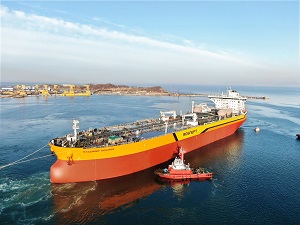 Igor Sechin told Vladimir Putin that the first Russian Aframax tanker named Vladimir Monomakh had been successfully launched at the Zvezda Shipyard. The powerful new-generation tanker is designed to transport oil in unrestricted navigation and in compliance with high environmental safety standards, stressed Igor Sechin.
Igor Sechin told Vladimir Putin that the first Russian Aframax tanker named Vladimir Monomakh had been successfully launched at the Zvezda Shipyard. The powerful new-generation tanker is designed to transport oil in unrestricted navigation and in compliance with high environmental safety standards, stressed Igor Sechin.
“It is a real victory. My congratulations,” the President of the Russian Federation said.
The main and additional power supply units can operate on both traditional and green fuel, the liquefied natural gas, which meets new world environmental standards.
The length of the vessel is 250 metres, width 44 metres, deadweight 114 thousand tonnes, speed 14.6 knots, ice class ICE-1A. Zvezda’s portfolio already has 12 orders for vessels of such type.
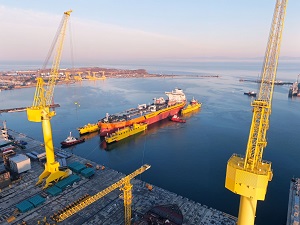 The Aframax tanker was launched with the Vympel floating transfer dock, one of the largest in Russia. Preparation for the launch took almost a day. Within this time, the tanker was rolled by a vessel trolley-transporter from the open outfitting slip to the floating dock, and then taken to the waters.
The Aframax tanker was launched with the Vympel floating transfer dock, one of the largest in Russia. Preparation for the launch took almost a day. Within this time, the tanker was rolled by a vessel trolley-transporter from the open outfitting slip to the floating dock, and then taken to the waters.
The construction history of this type of tankers has begun with the visit of President of the Russian Federation Vladimir Putin to the Zvezda Shipbuilding Complex in September 2017. It was then that a package agreement was signed for the design, construction, technical supervision, operation and training of the crews of 10 Aframax class tankers.
On September 11, 2018, in the presence of President of the Russian Federation Vladimir Putin, the laying of the first Aframax class tanker with a deadweight of 114 thousand tonnes took place.
Prior to heaving off the first tanker, four Aframax tankers were in production at the heavy outfitting berth, and metal cutting was carried out for the fifth one in February 2020. The vessels are being built for Rosnefteflot. Aframax tankers will be the first of this class built in Russia. The tankers are equipped with the most advanced class A automation system.
Vostok Oil Project
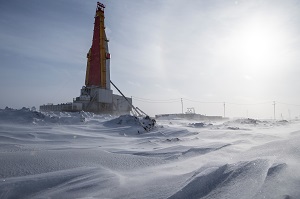 In addition, the head of Rosneft reported to President of the Russian Federation Vladimir Putin about drilling a prospecting and exploration well in the West-Irkinskoye licence area of one of the largest oil and gas projects in the world, Vostok Oil, which combines the already developed fields of the Vankor cluster and new fields in the Krasnoyarsk Territory.
In addition, the head of Rosneft reported to President of the Russian Federation Vladimir Putin about drilling a prospecting and exploration well in the West-Irkinskoye licence area of one of the largest oil and gas projects in the world, Vostok Oil, which combines the already developed fields of the Vankor cluster and new fields in the Krasnoyarsk Territory.
The resource potential of the Vostok Oil project exceeds than 5 billion tonnes of light low-sulphur oil, superior in quality to Brent crude oil. The potential for oil supply to commodity markets is estimated at 25 million tonnes in 2024, 50 million tonnes in 2027, and 115 million tonnes by 2030.
Vostok Oil is a mighty growth driver for the Russian economy. According to the Institute of Economic Forecasting of the Russian Academy of Sciences, the expected economic effect is 9.3 roubles for each invested one. The project implementation will yield an additional 2% increase in GDP annually.
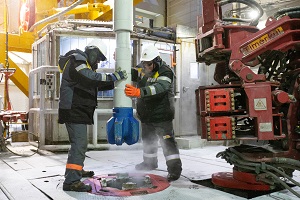 The President set a task for the coming years--to ensure the operation of the Northern Sea Route, making it a full-fledged transport artery with year-round navigation.
The President set a task for the coming years--to ensure the operation of the Northern Sea Route, making it a full-fledged transport artery with year-round navigation.
Vostok Oil will provide a significant portion of the cargo flow through the Arctic transport route. Over 100 million tonnes of hydrocarbons produced at the project fields annually will be transported by ice-class tankers along the Northern Sea Route; these vessels are already being built at Russia’s first heavy civil shipyard Zvezda.
Note for Editors:
The Zvezda Shipbuilding Complex is being implemented by the consortium of investors led by Rosneft Oil Company. The shipyard is being built using fundamentally new technological solutions that will make it one of the most advanced shipbuilding facilities in the world.
The construction of Zvezda is carried out in two stages, which enabled the construction of a number of ships, including the most sophisticated Aframax tankers, before the completion of the second stage. Commissioning of the second stage will expand the shipyard’s capabilities and allow Zvezda to build vessels and marine equipment without any limitations. The shipyard overall completion is scheduled for 2024.
Zvezda’s product line includes tankers, gas carriers, drilling platforms, and ice class ships, including the world’s most powerful nuclear icebreakers, the Leaders. The Zvezda Shipbuilding Complex will rival foreign shipyards and provide Russia with a civilian fleet to develop offshore fields and smoothly operate the Northern Sea Route--the shortest route between Europe and Asia.
The West-Irkinsk license area is located on the Taimyr Peninsula, north of the 70 parallel and 400 km north of the Arctic Circle, on the right bank of the Yenisei River. The nearest town is Dudinka, 140 km south of the block.
The Vostok Oil project includes the Vankor cluster (15 fields, the largest of which are Suzunskoye, Tagulskoye, Bochnoye, and Vankorskoye fields), the West-Irkinsky block (Rosneft), the Payakha group of fields (Neftegazholding), and the fields of the East-Taimyr cluster.
Equipment and materials required for drilling in the West Irkutsk area were transported by the Northern Sea Route from the port of Arkhangelsk. About 10 thousand tonnes of cargo, including equipment and materials, fuel, and specialized machinery was delivered to the beginning of the drilling campaign.
Target depth of the well is 4,200m with the 1,500m outstep. Drilling is carried out by a unique Taimyr-001 echelon rig with a load capacity of 450 tonnes. The rig is designed for drilling in the Far North, at temperatures down to -50°C. The complete covering of the rig, including the tower, pipe rack, and working areas, ensures working in the wind up to 33 m/sec while providing high energy efficiency, the most comfortable working conditions, and eliminating adverse weather conditions downtime.
The rig is equipped with drilling mud collection devices that ensure compliance with the most stringent environmental standards.
The distinctive geography of the project provides for the transportation of crude oil along the Northern Sea Route to the rapidly growing Asian markets as well as to traditional European markets.
Rosneft
Information Division
Phone: + 7 (499) 517-88-97
May 12, 2020
These materials contain statements about future events and expectations that are forward-looking in nature. Any statement in these materials that is not a statement of historical fact is a forward-looking statement that involves known and unknown risks, uncertainties and other factors which may cause actual results, performance or achievements expressed or implied by such forward-looking statements to differ. We assume no obligations to update the forward-looking statements contained herein to reflect actual results, changes in assumptions or changes in factors affecting these statements.